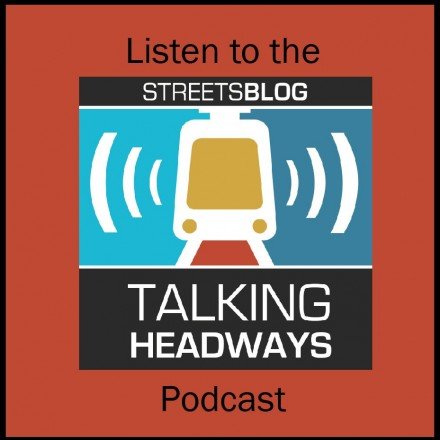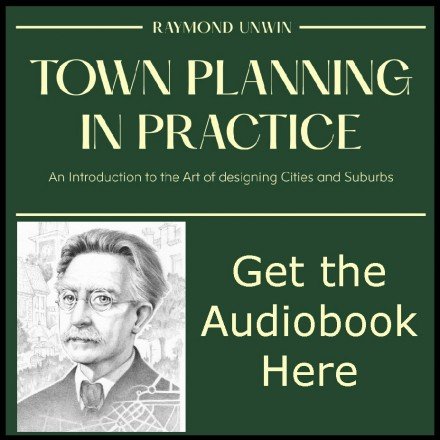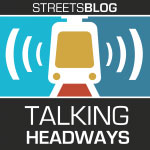(Unedited) Podcast Transcript 386: City Culture and Sports Stadiums
This week we’re joined by writer Dan Moore to talk about his piece in The Ringer entitled “What Do Cities Lose When they Lose Pro Sports?” Dan chats about why stadium deals are a bigger story about cities and how they can be harmful or potentially beneficial.
You can listen to the episode at Streetsblog USA or our hosting site.
Below is a full unedited transcript:
Jeff Wood (1m 32s):
Well, Dan Moore, welcome to the Talking Headways podcast.
Dan Moore (1m 46s):
Jeffrey. Thanks so much.
Jeff Wood (1m 47s):
Well, thanks for being here before we get started. Can you tell us a little bit about yourself?
Dan Moore (1m 50s):
Sure. So I’m a writer based in the bay area, California, born in the bay area, I guess, you know, for our purposes here today, a lifelong sports fan, I lifelong fan of the bay area sports teams, the east bay sports scene specifically here in Oakland. And that was sort of my entry point into certain topics that I covered in the essay. So you reached out to me about
Jeff Wood (2m 11s):
Nice. Nice. I see you have a green day poster to you. You’re definitely steeped in the bay area culture.
Dan Moore (2m 16s):
Yes, yes, sir. That’s right early green day for me specifically.
Jeff Wood (2m 20s):
Nice. Yeah. That’s the cover art for Dukey, I think, right. Good album. 1990 for the last such a long time ago. Well, so how do you feel about the east bay? I mean, how do you feel that the cities of the east bay and you know, the urban area in general?
Dan Moore (2m 36s):
Hmm. I mean, I am totally enamored of the east bay. I think Oakland is one of the best cities in the world. You know, I think it’s one of the most fascinating cities in the world. You know, I’ve been drawn to write a lot about it because I think that there are many aspects of it that, you know, it tells a great story, I think, with a rich history, from which a lot can be learned. And so, you know, that sort of draws me to it from a storytelling perspective, but also speaking of Oakland specifically, just everything else you hear about places true. It is so culturally dynamic so much great art is still made here so much great music.
Dan Moore (3m 16s):
The food here is incredible. I lived in new Orleans for awhile earlier in my life, and there are certain aspects of Oakland that remind me of new Orleans a little bit from the Victorian houses that you could still see around, particularly in the west to the same cultural richness. There’s just so much to love here. It’s hard to boil down the dwell down an answer
Jeff Wood (3m 40s):
Area. Well, so this is a little bit outside of our usual discussions about transportation city planning, but I thought it was an important discussion about urban pride and social capital for the most part. So you wrote a piece in The Ringer about what cities lose when they lose a sports team. And I was wondering what sparked you to write this piece specifically? Was it the impending loss of the A’s or was it general kind of loss of sports teams over time and in Oakland?
Dan Moore (4m 3s):
So I had been reporting for newspapers and magazines out here for a couple of years now on the Exodus from Oakland of professional sports teams, and more specifically the ongoing negotiations over the impending departure of VA’s the baseball team out here. And those centered around the proposed construction of a glittering new baseball stadium in west Oakland, red on the waterfront and wrapped up in that story, you know, both the opposition to the stadium plan, the back and forth over like who pays for what the people who are very much in favor of the stadium, construction, the fans, you know, it sort of swirling in that is a much larger story about why people love sports, what good they can do for a place and also what harm they can cause a place and what harm bad or one-sided stadium deals can have on a city’s built environment and on its culture and on its economy.
Dan Moore (5m 15s):
And so both at a sort of a ground level, there’s a lot of interesting stuff to report on, but again, maybe at a higher level, this story is a microcosm of something that I felt was probably interesting just from a general sports fans or someone who’s interested in cities. Generally, I thought there was a lot of interest there for people who don’t even know about Oakland. Really.
Jeff Wood (5m 36s):
Yeah. It makes a lot of sense. I mean, let’s chat a little bit about some history. I mean, there’s a long history of sports teams leaving cities before, you know, Oakland it’s really nothing new. I mean, the, the giants and the Dodgers came from New York, but you know, in the modern era, the thread of movement actually is, has kind of come up a lot of times. And, and I think the first one that comes to people’s minds, especially when they’re talking about people, threatening, leaving cities is the Baltimore Colts leading to Indianapolis. What changed in terms of the overall landscape in cities and in sports when the Colts left for Indianapolis,
Dan Moore (6m 6s):
I think twofold first, it sort of proved to team owners that they had licensed to effectively extort city governments to provide them with massive public subsidies that could in turn translate to beautiful new stadiums that have often proven very profitable for team owners. And so from 1984, when that happened, you sort of see this wave of team owners, holding cities over a barrel and saying, Hey, we need lots of public money to build a stadium, or we are going to take our services and our team elsewhere. I mean, that happens to this day.
Dan Moore (6m 47s):
It’s almost as if, you know, I mean, it’s more surprising when a team owner at some point does not do that to try to get a new stadium out of the city that they live. And then when team owners are somehow more humble or rather, you know, it’s rare to not see it now. So that is sort of the first thing that you really see happening there. The second thing of course is you see cities starting to acquiesce and build tons of new stadiums. I think in baseball alone in Baltimore, after the Colts left, the city government was galvanized into action and say, we don’t want to let the rest of our teams leave. And so what you see is they ended up building this admitted the beautiful new stadium for the Orioles.
Dan Moore (7m 33s):
Then they also built a new stadium for the Ravens. So I think we’re an expansion team who came their way, but so you see all over the sports landscape, the construction of these massive, massive, new stadiums all over the place. And so Baltimore really kind of kicked that off both a relocation and threatening spree on the part of team owners in this new construction, boom, both of which have proven often largely expensive or very expensive for cities.
Jeff Wood (7m 60s):
Well, that’s what it feels like. It feels like it’s super expensive for cities and they’re often left holding the bag when it comes to paying for these things we know about, you know, what’s happened in Oakland where, you know, the bond measure that was passed in there, they’re almost done paying that off for getting the Raiders back from Southern California, even though the Raiders are already gone now, right? It’s not even, they haven’t even finished paying for that. You have, you know, staying cranky, leaving St. Louis and go into Los Angeles. And it’s not just football and baseball. I mean, it’s all these other places where they kind of threatened to leave, but is it mostly an American construct because they don’t really necessarily see real Madrid leaving Madrid or Barcelona threatening to leave Barcelona or Byron Munich threatening a new stadium thing.
Jeff Wood (8m 42s):
Is this an American construct?
Dan Moore (8m 44s):
As I understand it, it is rather uniquely American. One reason it has to do with the fact that in Europe, you know, particularly in, in soccer, the idea of a club is elementally rooted in the community from which, you know, the club sprung up. You almost never see relocation in Europe. I mean, you certainly see the construction of big new stadiums, but you don’t see right. The owners of real Madrid trying to extort their local governments to give them lots of money under the threat of leaving you sure. Right. But you’re totally right. That it doesn’t really happen elsewhere. And I think the reason has to do with this more vaguely capitalistic conception of what pro sports teams are.
Dan Moore (9m 31s):
That’s taken root here versus the more vaguely collectivist conception that is common in Europe, where the teams are often they’re really rooted in, in the communities. They’re in a different way.
Jeff Wood (9m 45s):
I think that’s why the Superleague didn’t take off. Right. I mean, there was a big push to create a super soccer league in Europe. And a lot of the clubs fans freaked out and said, you know, we don’t want this. You’re going to leave the premier league. You’re going to leave the Lalique et cetera, to go to other places and to build a different league. And the fans were so up in arms about it, that they cut it out real quick, which was really fascinating from that standpoint. I always think about this too, in terms of the capitalist versus a more socialist sports structure. I always feel like the American sports is actually more socialist than European sports in terms of like how the structures of the businesses work. I mean, it’s a closed system in the U S and even MLS and soccer is a closed system. They’re fighting pro rail promotion and relegation tooth and nail to try to not let anybody else in.
Jeff Wood (10m 30s):
And at the same time in Europe, I mean, they have, you know, fair play statutes and things like that. But for the most part, I mean, you have the big clubs owned by the big owners spending billions and billions of dollars untethered to reality, to a certain extent. So it’s interesting to think of the capitalist instinct from a stadium and move movement perspective, but also the socialist instinct from a let’s close our system and make sure that only, you know, we are equal in terms of our league, you know, sharing revenue, et cetera.
Dan Moore (10m 57s):
Right. But you have an in America, especially in the four major sports is the leagues are essentially run like cartels in that, you know, like you said, they’re closed the market effectively for those leagues is totally controlled. You know, team owners don’t let new teams in, or rather they, you know, have control over the competition. So it adds a kind of perverse element to it, especially when you think about the way here in America, we have so willingly given ourselves over to these leagues. And I think we are probably getting better at it now and standing up for ourselves and for our cities and for our public tax dollars a little bit more.
Dan Moore (11m 38s):
And I think that’s also exemplified in Oakland too, but you go back, especially to the nineties when this craze of team owners relishing in their new found power and their new found ability to manipulate state and city governments when cities were just laying down and giving, you know, these really kind of very lucrative stadium deals, team owners, we seemed to just totally say to these cartels, okay, you know, we’ll, we will do what you want. We’ll build what you want. Just don’t move your team.
Jeff Wood (12m 12s):
What do the teams hold over cities? I mean, I’m thinking about this in the way of like, if, if you’re talking about an electorate and voters, right? The sports teams are so ingrained in City Culture, that it’s hard for a city to say no. When these teams say that they want to leave. I mean, if you think about the Raiders and how entrenched they were in Oakland, but also in, in Los Angeles, I mean, there’s a lot of folks in LA that still are Raiders fans from the time that they were there. And they’ll never give that up. And how much does that influence how much power these teams have over cities, that culture that’s created that loyalty, you know, the ability to even get out voters to vote for some of these stadium deals.
Dan Moore (12m 49s):
Yeah. I think that plays a big role. I think there are largely two things that come to mind. The first is team owners know how important their teams can be to the populace of a place. And that’s real that sports teams do confer a lot of intangible value to a place. They inspire pride. They create community, they create bonds both within the community and also within families. One thing in my piece, in The Ringer that I heard, time and time again, in the conversations I have with fans was how important it was for them to be able to take their kids to an A’s game one day and how important it had been when they were kids to be able to go to an A’s game with their parents.
Dan Moore (13m 32s):
And so all that’s real team owners know that team owners know the power that they have over cities to that end and they wield it. And so that’s one another is there’s a perception. I think that is very strong, particularly in a place like Oakland, maybe to a lesser extent, but you think about maybe like mid tier cities where having a protein seems to suggest something about them, that they are a major league city, that they are worthy of proteins and deserve to be in that discussion. And so that creates another kind of power the team owners use in these negotiations to on the other side, it very much powers the desire of other cities who like Las Vegas and they say, we want your football team.
Dan Moore (14m 17s):
We want that status. We’ll give you $750 million in public funding to acquire it. And so I think those are a few of the levers that team owners use.
Jeff Wood (14m 29s):
It’s interesting that they’re so aspirational in that way. I remember I grew up in Houston and, you know, the Oilers were a big thing and then they left to go to Tennessee. And, you know, before that, you didn’t as a kid anyways, I didn’t hear much about Tennessee, but then you hear about Tennessee. And so you think of these places that get a sports team and they come into your consciousness. It’s almost like college football where the universities are basically these teams to be big advertisements for the school and using them as a way to kind of create that aspiration for people to want to go there. It’s interesting to think about it from that perspective, from a city perspective, from a Nashville or others, you know, mid tier cities, like you’re talking about, I’m wondering how many of those investments that they made in these stadiums actually, you know, turned out from that perspective of making them their profiles bigger on a national or even international stage.
Dan Moore (15m 17s):
Yeah. And I think there certainly are examples of it working out that way. I think of Oklahoma city, for example, which if you set aside sort of the shady way that they acquired the formerly Seattle Supersonics Sam Anderson writes about this and BoomTown is excellent book on Oklahoma city where the thunder, when they began to exist in Oklahoma city, they did, they played a key role in a Renaissance or a revival campaign of downtown Oklahoma city. In that arena that was built. There is positioned in the book at any rate. I haven’t been to Oklahoma city, but it is sort of the centerpiece of that revival initiative.
Dan Moore (15m 58s):
You look at a place like San Francisco or San Diego as well, where the new stadium that San Francisco built the giants that in arguably succeeded in improving and beautifying and refining that part of the city. And so that potential is very real too. And you do see that happening. And that’s what Oakland, I think wants more than anything else. The political leaders who are fighting to keep the A’s and we’re fighting to Greenlight the stadium, they want to maintain that sense of matriarch status, everything that we’ve talked about so far, but they also very much want to revitalize that pocket of downtown and stadiums can be a vehicle of doing that.
Dan Moore (16m 40s):
And by virtue of that fact, proteins can be a vehicle of doing that can being a key word. It doesn’t always quite work out like that often. It doesn’t, but I think that’s another piece of,
Jeff Wood (16m 52s):
It’s interesting to think about the chicken and egg effect of that too. I mean, I feel like cities generally have been revitalizing or, or gentrifying or displacing people since the nineties in this kind of back to downtown movement. And you have to question whether, say like the giant stadium was actually the, the catalyst, or it was just kind of the first piece in an already falling line of dominoes. The idea that these stadiums are kind of the catalyst is really interesting to think about, and I’m sure there’s been plenty of research done on this, whether the stadium was actually the catalyst or whether it was just a result of kind of headwinds going in that direction already.
Dan Moore (17m 28s):
I think that’s totally fair. And the majority of research, which I became familiarized with in part through writing this piece, in fact suggests the opposite would, well, you might be getting that is that often stadiums themselves don’t have, at least it’s difficult to attribute directly to stadiums much of an economic impact. It seems rare that you find a stadium that you can point to and say, this inspired even a net positive effect on the local economy here. I guess I bring up San Francisco in a place like San Diego from more of like an eyeball test where like you look at before and after pictures of even when the stadium was being built in San Diego, for example, this picture was making its rounds on Twitter.
Dan Moore (18m 10s):
Recently it showed downtown San Diego right before the stadium was built and it showed it today. And you know, it is, it’s a meaningful difference. The place looks totally different. And so, yeah, I think it’s very difficult to attribute that to the stadiums itself, but certainly I think that, you know, the unscientific eyeball test that hold sway in people’s minds. And I think that that is one thing that’s definitely in people’s minds here in Oakland, as they look across the bay to try to base them where the giant stadium is and, you know, studies be damned, they look at it and they say, I want that. We want that for,
Jeff Wood (18m 47s):
It’s also interesting for these sports team owners that, that it’s no longer, just good enough to own a team and build a stadium and make money off of that. It has to be a real estate deal. And it has to be, you know, building hotels and conference centers and residential real estate. So like at Howard terminal, which is where the A’s want to build their stadium, it’s not just a stadium deal. It seems like it’s more than that. And I think that that’s the direction that many of these owners have going. Cause I, I think that they’ve realized that they’ve siphoned off as much as they could siphon off with sports teams alone, they go into mogul status where they want to, they want to try to, to become real estate masters. And I think that that is kind of the way of things as well. These days in the stadium is a piece of it, but then it gets the piece of the pie that they want is larger.
Dan Moore (19m 28s):
I think what, well, first to put it into perspective in Oakland, the anticipated construction costs for this project, the waterfront ballpark project, the stadium itself is anticipated to cost $1 billion. But the total of the real estate development project as conceived in the project plans is somewhere around $12 million. And so, you know, what opponents of this are saying is that the stadium is sort of like a Trojan horse. That’s really designed to allow John Fisher, the owner of the AEs to create this likely, massively lucrative real estate, little town on the west Oakland waterfront there.
Dan Moore (20m 13s):
And so you’re totally right that that’s the larger trend that we’re seeing. And I think that skeptics of the A’s out here are pointing to that and saying, this isn’t about the A’s, this isn’t really about baseball. It is about creating a massive, and again, likely very lucrative real estate development on some of the most profitable property in the country that waterfront right on the bay there,
Jeff Wood (20m 40s):
It’s interesting what that place is now. It’s, you know, it’s a container terminal, the area around it. West Oakland is historically disadvantaged. Also, if you take a Bart train over and I do every Wednesday to go visit my family and these pay, if you take the train, you see out the windows kind of what the situation is in California, that people, a lot of folks who are complaining about what does it mean for the neighborhood overall, if this happens, is it going to get people displaced? Is it going to change their fortunes in a positive direction? Which way is it going to go?
Dan Moore (21m 11s):
Well,
Jeff Wood (21m 12s):
Or both? Maybe
Dan Moore (21m 14s):
It’s hard to say. I think that the answer would probably be both. I think when you talk to people who live in west Oakland and when you talk to people in Chinatown and in the surrounding communities there, what you just described as a massive concern and for them, that is their foremost reason for opposing the project. Really, you know, I think that from what I’ve read, large scale public private construction projects like this, they exacerbate or worsen certain issues that just happen to be in Oakland. The, you know, most sincerely felt issues happening right now, gentrification, displacement, homelessness, you know, there’s a world where this project gets built and it totally changes the surrounding area and everyone who lives there now is disregarded and is displaced.
Dan Moore (22m 9s):
And that could be that for those people. And I think that the people who live there now are the ones that I’ve spoken with. They’re very concerned about that in addition to things like increased pollution, for example, you know, in addition to just the affordability of the area and gentrification and things like that, to give the people, negotiating the project or negotiating the developer agreement between the city and the A’s credit, there is a world where they can win an agreement that takes appreciable mitigative measures to that end, where the A’s are compelled to create a meaningful amount of affordable housing or to, you know, for among the billions of dollars of condos and apartments that are going to be created.
Dan Moore (22m 57s):
Maybe there’s a world where it can be negotiated where enough of that is affordable to, you know, offset some of that damage that you speak of and predict that I think is making up the lion’s share of the disagreement between the two parties right now. But I do believe there are folks fighting for that. You know, I don’t exactly have the answer so far as how it’s going to turn out. I think it is crucial that the people who are working on who are negotiating this, you know, don’t sell out the west Oakland community and the Chinatown community, because it’s precisely, as you say, you know, it could be very damaging.
Jeff Wood (23m 35s):
It’s also interesting to think about all of the opposition that’s going against the plans, not just here but around the country. I mean, before in the nineties and the two thousands, it felt like these plans were really easy to done, right? And now it seems a little bit harder. And I think part of in California, the, the thing that happened was Jerry Brown got rid of redevelopment. That helped a lot, I think in terms of giving people a way to push back on some of these deals and make owners pay more for the stadium than having taxpayers do it. Obviously we have these infrastructure TIFF type things now that allow, you know, cities to kind of set up for not just stadiums and this, this real estate thing, but any development that got restructured after redevelopment disappeared. I’m wondering though, what is the nature of the descent as it were people pushing back and, and do you think you’ll see more pushback around the country from people who are tired of giving these billionaires more?
Jeff Wood (24m 24s):
Billions,
Dan Moore (24m 25s):
Certainly. I think that you have, you’ve seen it in pockets. I wrote something for a magazine out here called the Oakland side last summer about the community benefits agreement that a variety of stakeholders from within Oakland are working on right now. And that will eventually be tied to any developer agreement that’s agreed to or not agreed to by the AEs and the city. And if you look at other CBAs that have been negotiated and one across the country, there are examples of CPAs that have pushed back against one-sided development deals and that have effectively protected those communities from those developments, damaging effects.
Dan Moore (25m 8s):
It has happened in Pittsburgh and a few other examples. And I think that’s an important weapon that communities have in their back pockets. And I think that one shift you see a little bit is that in more of these development deals, there are CBAs that are, that are tied to them and if they are specific and if they have teeth, they can be effective. I think that the opposition that you see in Oakland, maybe opposition is the wrong word. The skepticism that you see from people who are like on the CBA steering committee for this project here in Oakland, they hope to use the CBA to protect communities against pollution against gentrification.
Dan Moore (25m 51s):
They want to ensure that spoils from the project, you know, down the line, go, not only to John Fisher NDAs, but that, you know, Oakland itself can see material benefits from this, you know, as is an important part of the pitch, you know, as it stands right now. And so, you know, the opposition, the concern is rooted in much of what we’ve been talking about here. I guess one point is we should make sure to pay attention to the CBA. And if the CBA that is eventually tied to this deal is something that people in the community are happy with. And they say, yes, we believe in this.
Dan Moore (26m 31s):
That could be a good sign. I think I personally have my doubts about whether John Fisher and the A’s are prepared to agree to a CBA that is so agreeable to the community, but I suppose we’ll have to wait and see,
Jeff Wood (26m 45s):
It’s funny when you say CBA, I consistently think not community’s benefit agreement, but collective bargaining agreement and something that sports teams go through a lot with their, with their players and whatnot. I feel like I’ve been a little bit negative and I don’t mean to be because I love the A’s. I mean, I have picture of from my sister’s wedding of me with a red nose, because we went to an A’s game, you know, the day before. And so there’s history there and I do, you know, love Oakland as well. I feel like I worked there for eight years. I feel like a connected go to a lot of first Fridays and things like that. But what happens, I mean, if, if the A’s leave is a, is it a Rootstown now? I mean, is it going to be a place where, you know, the soccer team thrives and collects all of the folks that, you know, felt wronged by all of this teams that have left them?
Dan Moore (27m 29s):
Yeah. It’s an interesting question. I think that the roots are a great organization, and I do think that if the A’s were to leave, you would probably see, I mean, there’s already lots of momentum and excitement about the roots in Oakland, but you would see that probably increase. You would likely also see renewed vigor around embracing the roots and maybe even building them a new stadium, just because there would be a new found appreciation, both for a team that wants to be here, but also, you know, a sense like, okay, well we need to rally around something. If the A’s were to leave it, some good could happen. There is very well. I mean the bay area is what, like the sixth largest television market in the country,
Jeff Wood (28m 14s):
Huge amount of people, 7 million people in the region from, you know, Oakland San Jose,
Dan Moore (28m 18s):
Because the east bay alone has like a, you know, two or 3 million. I think I find it hard to believe that if the A’s were to leave some other ownership group, wouldn’t seize this opportunity and potentially even build at the Coliseum site. I think Dave Stewart, who was an old days player, his organization has expressed interest in buying the Coliseum site. My larger point is if the A’s leave, I think a yes, Oakland becomes in the interim of Rootstown so far as sports goes, but I, I would believe that somebody else, another ownership group would try to bring a team here, be it an expansion team, or, you know, some other kind of relocation. There’s just so many people here.
Dan Moore (28m 59s):
And Oakland is such a great sports town. I mentioned this in the piece at one time, it was referred to commonly as the greatest sports city in the nation. You know, I find it hard to believe that people wouldn’t want to try their hand here or seize that opportunity. And I guess, while we’re talking about the Coliseum site in deep east Oakland, you know, the A’s are adamant that that is not a viable site for a new stadium. I bet you would see people who would be willing to test that theory.
Jeff Wood (29m 29s):
That doesn’t make any sense, honestly, that it’s not a viable place. It has barred access. It has freeway access for those who like to drive to games, there’s a huge amount of space to do their parking lot. And all of the, the tailgating that goes on for games, it seems ridiculous that that’s not a viable site. I feel like it’s only not viable in their minds because they have a, an impression of place that, that Oaklanders don’t have, but maybe the ownership has because of their preconceived, maybe negativity is the wrong word, but you know what I’m saying? Just kind of like a notion.
Dan Moore (30m 0s):
Yeah. And I think that in the context of baseball stadiums, especially there is historical precedent and it kind of romantic desiring for the downtown urban garden ballpark. And so it’s hard to blame the AEs for and started with Oakland, even, you know, for getting excited about the idea of a downtown Juul box park. You know, like the ballparks of old they’re sort of built into the fabric of the city. Now that’s something that excites me as someone who interested in cities and who loves baseball that said the idea that the Oakland Coliseum site is a bad site for sports is I agree.
Dan Moore (30m 40s):
I don’t think that that’s correct. One could make the argument that it is that it will be much, much easier if the A’s do build a stadium at the Howard terminal site, one could argue that it will remain infinitely easier to get to the Colosseum than it ever would be to get to our terminal, which is a mile from any Bart stop. And, you know, do, which is only accessible through presently sidewalk lists side streets right now, you know, there’s so much opportunity on that Coliseum site. All the infrastructure for a stadium is obviously already there. In addition to the, you know, means of access you described, there’s also an airport with a bark connection to the airport that leads right to the Coliseum.
Dan Moore (31m 21s):
There’s an Amtrak station right there with a little love and care. That could be a hub of sports. Love that also succeeds in reviving east Oakland in the manner that everyone who is invested in the west Oakland ballpark project, you know, promises will happen there. And so you could see revival in the area around the Coliseum too. If someone invested in it the right way,
Jeff Wood (31m 48s):
You mentioned earlier kind of the family aspect of things. I’m curious more about that. You have the, the supporters groups that you talked to for the article. There’s a lot of folks, obviously that are tied to the A’s. I know a certain Bart supervisor who goes to games frequently with their wife, you know, it’s, it’s tied to people and place here in the bay area, especially in Oakland. I’m curious what their kind of outlook was, you know, for the listeners, how they’re feeling about this as people who are deeply embedded in the culture of the AEs and of sports in Oakland, generally
Dan Moore (32m 17s):
My read on it is a majority of the folks that I’ve talked to who have that kind of elemental tie to and love for the AEs in particular, the people whose concern is foremost, the A’s want them to stay, and they don’t really much care how that happens. A lot of those people are frustrated and confused with the A’s reluctance to build at the Coliseum site, but they are willing to get behind the Howard terminal proposal because it serves preeminently in their minds as a means of keeping the A’s in town. That seems, you know, for people who care most about the A’s, that is their main motivation, at least from the folks that I’ve spoken with.
Dan Moore (33m 0s):
There’s also a subset of fans who are sort of disgusted with the Hayes behavior of late the behavior of VA’s owners, rather
Jeff Wood (33m 10s):
On the field too. I mean, not just this stadium thing, but you know how they’re putting players on the field and the product that they’re putting out there generally,
Dan Moore (33m 17s):
You know, it feels to me that the relationship between a city and a team comes down so much to the motivations and, you know, beneficence of team owners, if a team owner wants there to be a good relationship, if they want to proudly represent and be a positive force for the community, then, then you see that and you feel that, and that is, you know, often times it happens. What you’re seeing with the A’s right now is sort of the exact opposite. It feels like they’re holding this community asset hostage and they are taunting fans and starving the asset as a means of trying to get what they want.
Dan Moore (34m 1s):
And I think that is creating a lot of distaste in the hearts of fans, who I think know what proteins can be and can do, and you know, how great and how beneficial the A’s have been to Oakland when they’ve been invested in properly and what that experience can be like at the Coliseum. One thing. So the late eighties, when the Haas family owned the A’s and they marketed the team and they spent money on great players and they made improvements to the Coliseum and the end game experience, you know, not only were the A’s great and not only did they inspire lots of love within Oakland and out, but the A’s ranked tops in the major leagues and attendance for five years in a row.
Dan Moore (34m 42s):
And so it feels fair to say that much of what you’re seeing in Oakland now. And certainly the low attendance now is a product, not of bad fans, but of bad treatment and disinvestment on the part of the owners.
Jeff Wood (34m 56s):
It’s interesting to think about that in the context of what’s going on kind of nationally in places like Cincinnati, where some of their ownership and their general manager has contempt for the fans. And I think I see this in European soccer as well, when, when the owners and the fans don’t get along very well, there’s airplanes in the air and banners and so-and-so out right, is the usual cry from fans. And I think it’s interesting to think from a fan perspective, like what they would do if they felt like, you know, if a fan had a billion dollars and bought a team like what they would do, and if they saw it as a business, or if they saw it as something that they just loved and wanted to give back to the community. It’s interesting to think about all these owners that see it as a business versus the owners that see it as kind of their baby or their lifelong and how they treat it, treat the fans, treat the players, treat the cities that they’re in.
Dan Moore (35m 43s):
Yeah. Or team owners who understand that this asset that they own, the team is not just a means of, of making money. Although team proved incredibly profitable for, for most team owners. What they have is something that matters to the community. And I think that, you know, it’s a community asset. And when you have team owners who not only love the sport that, you know, they are invested in and not only care about the success of their, on the field product, but who appreciate, you know, what their product means to the community. You see the difference.
Jeff Wood (36m 20s):
What’s next, what’s next for the Oakland generally. Do you think nasal stay, or do you think they’ll go, what’s your gut feeling?
Dan Moore (36m 27s):
Well, there are a couple consequential dates coming up on June 30th, the San Francisco bay conservation district, SFB CDC and agency charged with governing the waterfront. There is going to hold a formal vote as to whether they are going to Greenlight eliminating maritime use at the Howard terminal site. If they don’t, if they vote not to, that would effectively mean that the AEs can not build there. And from what, you know, John Fischer and David will, VA’s presence have made abundantly clear. If they’re not able to build there, they’re going to move the team likely to Las Vegas.
Dan Moore (37m 8s):
So we may find out on June 30th, if that municipal body says DA’s, can’t sorry, we have to keep the support. And that’s how our terminal is right now. It’s part of the port of Oakland. Then I think it’s almost a foregone conclusion at that point that the aides would leave. If that agency says, yes, you can, you can turn this into a stadium. I think that by this point, all parties involved from the A’s to Oakland city government have invested so much time and have so much on the line that I find it hard to believe that either side would at this point, let the project die over relatively small disagreements.
Dan Moore (37m 52s):
So for example, you know, the A’s are spending millions and millions of dollars in this effort to fund environmental impact reviews and to conduct these negotiations and all that. They want this to happen. Obviously, of course, they see the potential revenues that might come from having a privately owned stadium in this spot, but along with all the real estate development. So they want it to happen for all the reasons we discussed earlier, the pressures on the Oakland city government to not let another team leave to not no longer be seen as a major league city. You know, the, the desire to want to provide, you know, to keep this for fans, all that is real. They want this to happen.
Dan Moore (38m 32s):
I would say that for those reasons, the project will move forward. Now, the one thing that could happen is, you know, not much is known about John Fisher, other than the fact that he’s incredibly frugal. It could come to pass that even if the project is green-lit from the state level and they say, okay, you can go ahead and build here. Let’s say the steering committee for the CBA puts forth and finalizes a community benefits agreement that would require the AEs to be too generous or more generous than John Fisher wants to be. I could potentially see him deciding to walk away from the deal at that point. My hope as someone who loves Oakland and has spent a lot of time in the community, talking with people, there is that CBA is strong and that, you know, all the interests of that part of Oakland, as it exists now are accounted for and represented and fought for.
Dan Moore (39m 27s):
I hope that it is hard for the A’s. I hope that they do invest meaningfully in the community in part to mitigate some of the deleterious effects of large-scale development. But again, we’ll see. So roundabout way, long-winded way of answering your question. I do think it moves forward, except I hope that it moves forward the right way.
Jeff Wood (39m 47s):
Yeah. Understandable. Well, the article is What Do Cities Lose When they Lose Pro Sports and The Ringer. Dan, thanks so much for joining us. We really appreciate your time.
Dan Moore (39m 55s):
I appreciate it. Jeffrey. Thanks so much.










